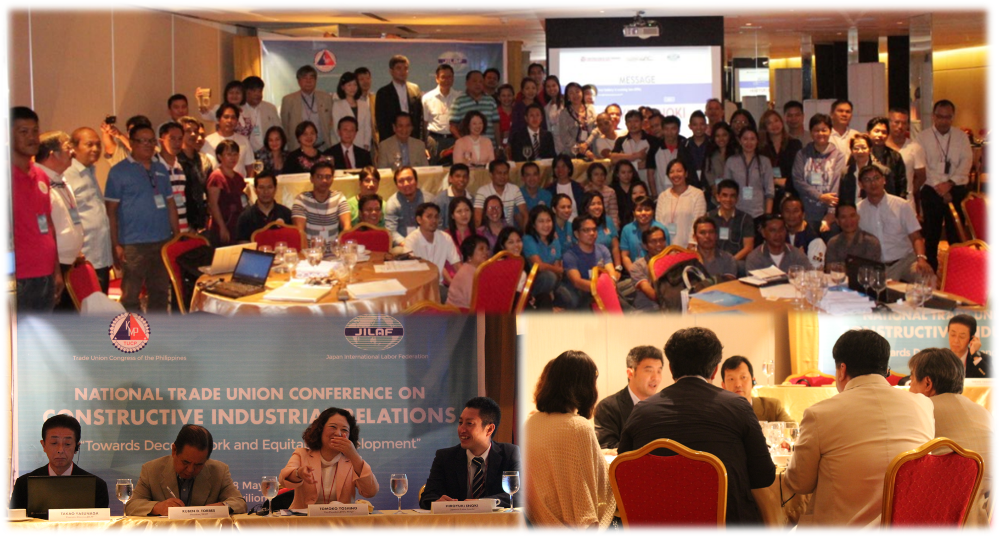(Report on the National Conference on Constructive Industrial Relations,
17-18 May 2016, Manila)
5.18.2016, Manila. –Some 1,000 trade union leaders (41% women) reiterated workers’ call for passage of stronger, better, and workable labor law to ensure security of tenure and constructive industrial relations in the country amidst pervasive use of contractual and precarious employment arrangements.

Workers made the call in a two-day national conference on constructive industrial relations, with the theme “Towards Decent Work and Equitable Development” in cooperation with the Japan International Labor Foundation (JILAF) and the Japan Trade Union Confederation (JTUC-RENGO).
At the opening, TUCP President Ruben D. Torres highlighted current challenges in the Philippine labor market, including unemployment and underemployment that is affecting young and women workers, pervasive use of contractual employment, and decreasing union membership due to the difficulty in organizing. He noted that the “time-honored morality, tradition, and correctness” of international labor standards, particularly ILO Conventions 87 and 98 suffer from lack of compliance. He expressed hope that the conference will “bring our minds together to better appreciate socio-economic realities, and come up with practical actions to organize and build union power.”
JILAF Executive Director Takao Yasunga and JILAF Director Futoshi Suenaga provided insights on their struggle in forging unity in the Japanese trade union movement. They shared about “Shunto” (Spring Offensive), an annual collective trade union action for wage increase, profit sharing, labor relations, and better working conditions in Japan.
Resource persons from TUCP-affiliated enterprise-based unions highlighted the struggle for union recognition and collective bargaining negotiations. They decried the continuing resistance of many employers to respect workers’ freedom of association and collective bargaining and the apparent lack of positive action by local and national DOLE officials to promote workers’ rights.
Dr. Joseph Jovellanos, president of the Samahang ng Manggagawang Pilipino-National Alliance of Teachers and Office Workers (SMP-NATOW) and Teachers of the Philippines – Public Sector (TOPPS) General Secretary Marvie Michaela Sagun discussed the travails of unions in both private and public academic institutions, particularly in light of the implementation of Kto12 basic education.
Voice in the Call Center (VOICE) President Angelita Senorin, a national union of workers in the call center industry, discussed the results of several studies and actual stories of workers, mostly young people, about the negative impact of night work and stress that workers in the sector are subjected to on a daily basis. Further, VOICE said that, despite sustained efforts, the BPO industry remains union and CBA-free. Project-based tenure, bond, wages, working conditions, high stress levels, cruel work hours, shift-changes, unhealthy work and lifestyle, equal pay for equal amount of work, strict performance metrics, metric of “adherence”, quota for upselling”, among others, are serious workers’ issues in the industry. These and the recurrent disputes between and among workers and their managers have not been enough to spur unions. (VOICE and the BPO Workers Association of the Philippines (BWAP) are industry unions doing organizing work in the BPO industry –one of the key employment generators in the country. BWAP entered into training and recruitment agreements with certain BPOs, but these have yet to be implemented effectively.)
Alliance of Workers in the Informal Economy Sector (ALLWIES) President Susanita Tesiorna presented the challenge and course of action towards formalizing workers in the informal economy. She discussed the ILO recommendations to serve as trade union reference for transitioning to formality, i.e. (1) growth strategies and quality employment generation; (2) regulatory environment, including enforcement of ILS and core rights; (3) organization, representation, and dialogue; (4) equality: gender, ethnicity, race, caste, disability, age; (5) entrepreneurship, skills, finance, management, access to markets; (6) extension of social protection, social security, social transfers; and (7) local [rural, urban] development strategies.
Bureau of Working Conditions (BWC) Senior Labor and Employment Officer Nick Bon and National Conciliation and Mediation Board (NCMB) National Capital Region Executive Director Tess Audea presented the new labor law compliance system (LLCS) and Department Order No. 107-10, series of 2010 “Implementing Rules and Regulations on the Mandatory Conciliation-Mediation Law” or Republic Act 10396, respectively.
National Wages and Productivity Commission (NWPC) Deputy Executive Director Jeanette T. Damo discussed DOLE’s Green Workplace Advocacy Program which focuses on creating green jobs and mitigating the negative impact of climate change. The Program is anchored on awareness raising, knowledge building, organizational strategies and green jobs advocacy. One of the key strategies of this Program is the Green Productivity Program, she said.
The conference concluded with the flowing recommendations to promote better and constructive industrial relations: (a) put an end to CONTRACTUAL EMPLOYMENT, including those in private and public education institutions, by revoking DOLE Department Order 18-A,; (b) for government to come out with a national policy and programs on transition of informal to formal employment based on strategies recommended by the ILO; (c) for government and employers to observe the “by-stander rule” in workers’ exercise of the right to join unions and bargain collectively; (d) mandatory and random inspection, especially of hazardous and anti-union workplaces; (e) for K-12: retain or transfer teachers and employees, fund assistance for those affected and re-tooling; NOT RETRENCHMENT; (f) more investments for skills upgrading and human resources development, including productivity enhancement and promotion of profit-sharing schemes; (g) more effort and resources for organizing women and youth; (h) government and employer support for union climate change, green jobs and sustainable development programs; and (i) sustain cooperation with JILAF and JTUC-RENGO on capacity-building programs and union organizing, especially in Japanese multinational enterprises in the Philippines.
JTUC-RENGO Vice President Tomoko Yoshino and Japanese Labor Attaché Hiroyuki Enoki participated and greeted the participants at the opening. (*rem)
#WearMask #WashHands
#Distancing
#TakePicturesVideos

